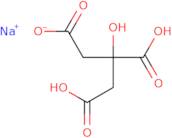Sodium citrate monobasic anhydrous
CAS: 18996-35-5
Ref. 3D-FS40774
| 1kg | Descatalogado | ||
| 2kg | Descatalogado | ||
| 100g | Descatalogado | ||
| 250g | Descatalogado | ||
| 500g | Descatalogado |
Información del producto
- 1,2,3-Propanetricarboxylic acid, 2-hydroxy-, sodium salt (1:1)
- Citric acid, monosodium salt
- Citrofluyl
- Dihidrogenocitrato De Sodio
- Dihydrogenocitrate de sodium
- E 331 (i)
- E 331i
- Monosodium citrate
- Monosodium dihydrogen citrate
- Natrium-Dihydrogencitrat
- Ver más sinónimos
- Natriumdihydrogencitrat
- Propane-1,2,3-Tricarboxylate, 2-Hydroxy-, Monosodium
- Sodium Dihydrogen Citrate
- Sodium citrate (NaC6H7O7)
- Sodium citrate (NaC<sub>6</sub>H<sub>7</sub>O<sub>7</sub>)
- Tinosan SDC
- sodium 3-carboxy-2-(carboxymethyl)-2-hydroxypropanoate
- 1,2,3-propanetricarboxylate, 2-hydroxy-, sodium salt (1:1)
- 1,2,3-Propanetricarboxylic acid, 2-hydroxy-, monosodium salt
Citric acid is a weak organic acid and a natural component of the human diet. Citrate is an important intermediate in the citric acid cycle, which occurs in the mitochondria of cells to generate energy. Sodium citrate monobasic anhydrous is a salt that contains sodium ions and citrate ions. It has been used as a model system for studying the biological effects of citrate on cell growth and viability. The reaction solution containing sodium citrate monobasic anhydrous was found to have synergistic effects with other agents, such as erythromycin, against aerobacter aerogenes. Sodium citrate monobasic anhydrous has also been shown to have antibacterial efficacy against bacteria, including staphylococcus aureus and salmonella enterica serovar typhimurium. As well, this compound has been studied for its potential use as a therapeutic agent for infectious diseases such as bowel disease.





